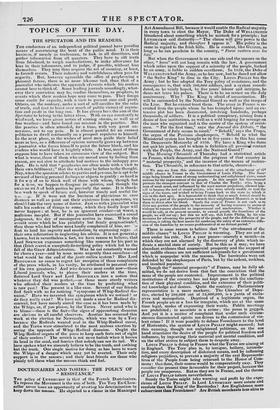TOPICS OF THE DAY.
THE SPECTATOR AND ITS READERS.
THE conductors of an independent political journal have peculiar means of ascertaining the bent of the public mind. It is their business, if merely as tradesmen, to look in all directions, and gather information from all quarters. They have to sift truth from falsehood, to weigh contradictions, to make allowance for bias in their informants, and to judge, if possible, without bias themselves. They may thus acquire the art of seeming, at least, to foretell events. Their industry and watchfulness often pass for sagacity. But, however agreeable the office of prophesying a pleasant future, there is no more irksome task than that of a journalist who indicates the approach of events which his readers cannot bear to think of. Some leading journals accordingly, what- ever their conviction may be, confine themselves, as prophets, to events which their readers hope may come to pass. They forego some credit for sagacity, with a view to present ease and profit. Others, on the contrary, make a sort of self-sacrifice for the sake of truth, and (not to boast over much of public virtue) of reputa- tion and profit in the long run. It has always been the aim of the
Spectator to belong to the latter class. With an eye constantly to windward, we have given notice of coming storms, as well as of
fine weather—and have found our account in the practice. But the practice is often attended, for a time, with very great an- no) ance, not to say pain. It is almost painful for an earnest politician to dwell continually on a prospect repulsive to himself. In the next place, as the wishes of most men guide their belief more or less, so a difference of opinion naturally grows up between a journalist who forces himself to paint the future black, and his readers who would have it brightly white. At best, most of them suppose him to have taken an erroneous view of the subject. But what is worse, those of them who are moved more by feeling than reason, are not slow to attribute bad motives to the unhappy pro- phet. He is told that "prophecies are often made with a view to
their own fulfilment ;" that the wish may be father to the thought. Nay, when the question relates to parties and persons, he is apt to be accused of having personal feelings or objects to gratify : so hard is it for asy of us to think well of those with whom, though but for a tine, we happen to disagree in opinion, and though the anxious Hifi of both parties be precisely the same. It is thank- less work to speak of future evil, however timely and useful the ..:g. If it were not the business of physicians to cure diseases as well as point out their existence from symptoms, we should Late the very name of doctor. Just so with a journalist who tells his leaders of things to come, which they fondly hope will never happen : at best, he is an ignorant croaker—at worst, a malicious mai plot. But if this journalist have exercised a sound judgment, his day of recompense arrives in time. When the events occur which he has painfully but firmly prognosticated, then those who had before most loudly complained of him, arc 'le first to laud his sagacity and resolution, by expressing regre :it their own infatuation in neglecting his advice. It is not generalty known, but is nevertheless a fact, we have reason to believe, that Lord SPENCER expresses something like remorse for his part in that (Irish coercion excepted) do-nothing policy which led to the fall of the GREY Administration. Was he not constantly warned for above a year—and by none more urgently than ourselves—of what would be the end of the juste milieu system ? Has Lord BROUGHAM no cause to regret his reception of those complaints of the press which, in his vanity, he attributed to personal envy of his own greatness? And who deserve most credit now—those Liberal journals who, to please their readers at the time, flattered Lord GREY and Lord BROUGHAM into a notion that whatever they did was perfect,—or those more sturdy writers who offended their readers at the time by predicting what is now past? Thu present is a like case. Several of our friends End fault with us for noticing "symptoms of Whig-Radical dis-
union." Have we invented the symptoms which we noticed ? or do they really exist ? We have not made a case for Radical dis- content, but have merely stated the case as it has been made by the Whigs, or, if you please, by the Tories. Never mind who is to blame—there is the fact—the signs of approaching disunion are obvious to all careful observers. Another has occurred this week at the election for Newcastle, which was won by a Tory because the Radicals wanted zeal in the Whig-Radical cause, and the Tories were stimulated to the most zealous exertion by seeing the approach of Whig-Radical disunion. Ought the Whig-Radieal organs of the press to keep such facts out of sight of their readers ? The ostrich is not more foolish when it buries its head in the sand, and fancies that nobody can see its tail. We have spoken what we sincerely believe to be the truth, and nothing but the truth. Our single motive for doing so has been to warn
the Whigs of a danger which may yet be averted. Their only support is in the masses ; and their best friends are those who plainly tell them what the masses think and feel.


























 Previous page
Previous page